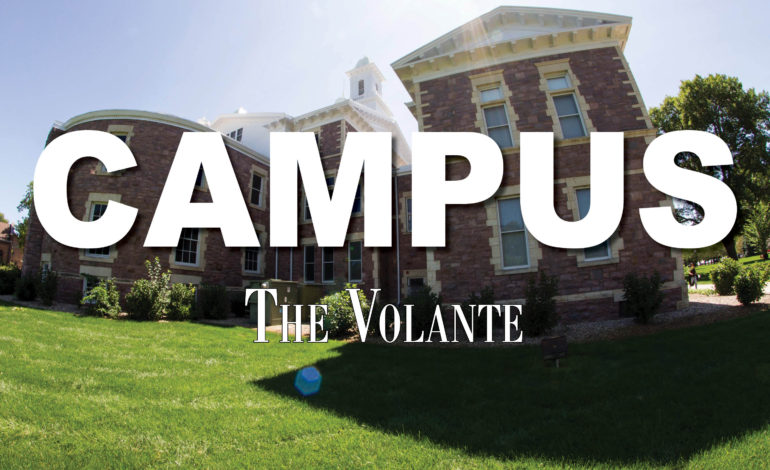
SGA proposed resolution to oppose the Opportunity Center
USD’s Student Government Association introduced two resolutions this week and passed Senate Bill 66, Senate Bill 67 and Senate Resolution 7.
Senate Bill 66 establishes a budget for First-Generation Student Organization, an organization started by Carter Linke. Linke is also the Director of Student Affairs for SGA.
“There was some confusion about what the difference between TRIO and First-Generation Student Organization,” Linke said. “TRIO you have to apply and there is only so many seats whereas for my organization, it has the potential to reach every student on campus.”
SGA conducted the third reading of Senate Bill 67, which is designed to increase SGA’s financial transparency. The bill was introduced by Braden Bury and passed unanimously.
“Just to go over the specifics of what’s becoming more transparent, it going to be the monthly organizational expenditure report made publicly available, the SGA Allocation Summary that is provided yearly and then the budget request form is going to be publicly available and the special appropriations request forms will be publicly available,” Bury said
Senate Resolution 7 is a Resolution of No Confidence of the Student Federation of South Dakota. The resolution was passed unanimously.
Caleb Weiland, the Director of Government affairs and senator responsible for introducing the bill said the resolution addresses systemic issues within the Student Federation and its adherence to the organization’s bylaws.
“I wanted to include (in the resolution) the (Student Federation) bylaws that I feel, either have not been met or have been blatantly ignored,” Weiland said. “We have three things in the resolution that we want to see happen, and it is to implement transparent fiscal policies, establish communication regarding their current and future lobbying efforts in the South Dakota Board of Reagents and the South Dakota State Legislature and to attend meeting that they’re contractually obligated to attend.”
Senator Phil Adam said the purpose of the Student Federation is as a lobbying group for students attending South Dakota’s resolution.
“So this resolution is just what Senator Weiland said, it’s a call for action and its saying here are the issues that we see,” Adam said. “This system is set up for failure as of right now.”
Senator Tallon Everson, introduced Senate Resolutions 8 and 9. Senate Resolution 9 would exempt student organizations from attending the developmental workshops SGA provides.
“We are just in the middle of the transition between doing our previous Campus Leaders Mixers which were held bimonthly during the school year and organizations have an expectation to attend on of those each semester but we’re now looking to transition towards a campus leaders conference which will just be taking place once a year,” Everson said
Addison Miller, the Director of Communications and the chair of the Campus Leaders Committee, spoke about the resolution.
“In future years, the semester in which the conference does not take place, organizations will still be expected to attend one Campus Leasers Mixer as per normal, just the semester that the conference is taking place, (the conference) would be the primary requirement,” Miller said.
Everson also introduced Senate Resolution 9, A Resolution in Opposition to the Establishment of an Opportunity Center at the University of South Dakota. Everson said the resolution is meant to take a step further than Senate Resolution Six, which was a resolution to support the Center for Diversity and Community.
“I think that we should take it a step further and take a more direct stance against this pretty harmful policy that students on campus seem to be pretty united and they’re concerned about,” Everson said.
Senator Max Mickelson said resolution could be rushing into things.
“Yes, we have a lot of students who are against the Opportunity for All Center, but most of them are getting confused about what its about,” Mickelson said. “We don’t know what it is really going to be until January.”
Dean of Students, Kim Grieve, said the Opportunity Center is supposed to add value to the University.
“There will be lots of training for leadership for students across campus. There’ll also be someone that will be in there that will provide support services, such as the Veteran Centers and Career services and things like that. So right now, it’s looked at as value added, and it’s not necessarily going to take office space in the CDC,” Grieves said.
Senator Rachel Overstreet said since a lot is not known about the Opportunity Center, then this resolution should not be hastily passed but expressed concerns about the university ignoring the needs of the CDC, both in physical space and in a director.
“I think the concern that a lot of students have is that the CDC seems to have been neglected in terms of hiring a director, and the student who are upset with the Opportunity Center is being established, and there seems to already be like action happening in the search for that and not one for the CDC.”
The resolution was sent back to committee. SGA will conduct the second reading of the resolution next week.

